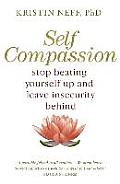Subtitle: Stop beating yourself up and leave insecurity behind
Kristin Neff is a psychology professor who focuses on self-compassion. Her book has a lot of helpful information – and also pushed my buttons. I think I’m not in her target audience.
While Kristin Neff talks about some emotional trauma in her life, there is an “us vs. them” feeling when she talks about trauma and mental illness, and an element of blame for self-defeating behaviors that arise from anxiety and self-criticism. It’s hard to read about compassion while feeling the raw edge of judgment.
I think she intentionally simplifies the discussion and examples for her intended audience, and “proves” her ideas by referring to small research studies where she gave questionnaires to college students.
I set the book aside in frustration, but I’m glad I went back to it.
Self-compassion is first compared with self-esteem. Self-esteem is an evaluation of our self-image, where self-compassion is a response to feeling fear, shame, or other painful emotions. Self-esteem depends on comparison and competition with others, where self-compassion reminds us of our common humanity.
To err is human. Better to be human than perfect. Moments of shame and inadequacy feel isolating, but all humans have them. Where do you excel? Where are you average? Where are you less than average?
She suggests gentle caresses, and kind words of acceptance. “Poor darling. This is really hard right now.”
Remember that our actions arise from an interconnected web of genetics, environment, past events, and current resources. Causality and blame are ambiguous. “Judgment defines people as bad vs. good. Discriminating wisdom recognizes complexity and ambiguity.”
Mindfulness helps us notice moments of suffering before (or while) dropping into blame and problem-solving. It helps us respond rather than react. Suffering = pain x resistance.
“One thing we have little power to change is what goes on inside our own heads. […] Thoughts and emotions arise unbidden and often overstay their welcome.”
Notice the experience of painful feelings in the body, and send yourself compassion for feeling that way. “Soften, soothe, allow.”
Three doorways into self-compassion: mindfulness, common humanity, kindness.
“This is a moment of suffering.
Suffering is part of life.
May I be kind to myself in this moment.
May I give myself the compassion I need.”
Self-compassion can be hard for survivors of childhood abuse because it is sometimes associated with the cycle of alternating kindness and abuse.
Self-compassion doesn’t magically make the negative thoughts and feelings go away.
Self-compassion motivates better than self-criticism, despite what many parents and teachers enact. Love, not fear. “What’s good for you?” instead of “Are you good enough?” Intrinsic vs. extrinsic motivation.
Sympathetic joy – appreciating others’ success and good qualities allows us to appreciate our own as well, and helps us stay aware of the positive in general. Celebrate achievements, which also come from a mix of genetics, environment, etc.
Through the book, Neff talks about how helpful self-compassion has been with her husband Rupert and son Rowan, especially when Rowan was diagnosed with autism. At the end of the book she describes their adventure in Mongolia, combining horseback riding with shamanism to help Rowan, chronicled in the documentary and book, “The Horse Boy.”


[…] Recommended by: Kristin Neff mentions her husband’s book about their journey to Mongolia in her book Self-Compassion. […]